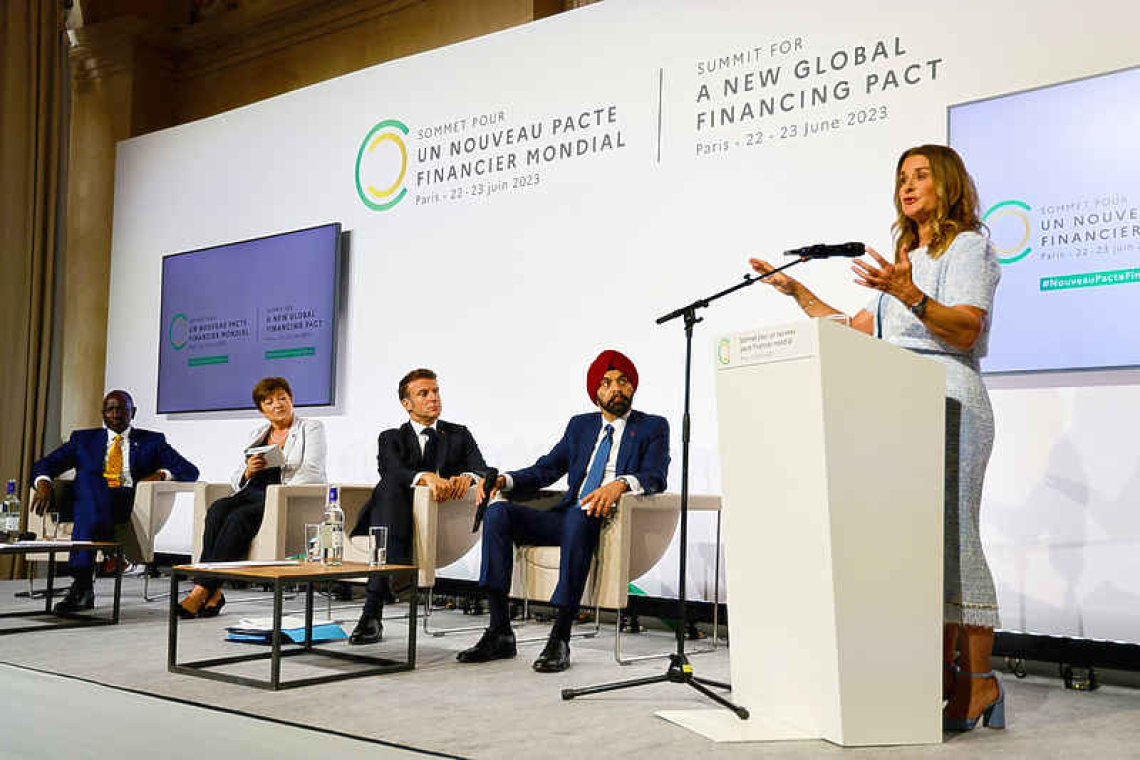U.S. philanthropist Melinda French Gates speaks as she take part in a round table to discuss global economy with Kenyan President William Ruto (Sitting on far left), French President Emmanuel Macron (Sitting second from right), World Bank President Ajay Banga (Right) and Managing Director of the International Monetary Fund (IMF) Kristalina Georgieva during the New Global Financial Pact Summit at the Palais Brongniart in Paris, France on Thursday.
PARIS--The World Bank will ease financing for countries hit by natural disasters, it said on Thursday, as the International Monetary Fund announced it had hit its target of making $100 billion in special drawing rights available for vulnerable nations.
The two announcements were made at a gathering in Paris of some 40 leaders, including about a dozen from Africa, China's prime minister and Brazil's president, that aims to give impetus to a new global finance agenda. It aims to boost crisis financing for low-income states and ease their debt burdens, reform post-war financial systems and free up funds to tackle climate change by getting top-level consensus on how to promote a number of initiatives struggling in bodies like the G20, COP, IMF-World Bank and United Nations. An announcement about Zambia's debt was also expected later on Thursday after its creditors indicated this week a restructuring proposal was nearly ready after more than two years of negotiations. "It is clear that the international financial architecture has failed in its mission to provide a global safety net for developing countries," United Nations Secretary General Antonio Guterres said, calling the system outdated, dysfunctional and unjust. Leaders are set to back a push for multilateral development banks like the World Bank to put more capital at risk to boost lending, according to a draft summit statement seen by Reuters. In remarks to a panel on Thursday, new World Bank president Ajay Banga outlined a "toolkit", including offering a pause in debt repayments, giving countries flexibility to redirect funds for emergency response, providing new types of insurance to help development projects and helping governments build advance-emergency systems. "We need a robust and predictable financial safety net," Ethiopian Prime Minister Abiy Ahmed told the conference, calling for a boost to below-market financing and more grants. "African countries are facing an unprecedented funding squeeze which have aggravated the vulnerabilities," he said. While the new World Bank measures are designed to give developing nations some breathing space, there was no discussion of multilateral lenders offering debt writedowns - so-called haircuts. China - the world's largest bilateral creditor - has been pushing for lenders like the World Bank or the IMF to absorb some of the losses, which the institutions and rich countries oppose. Citing the war in Ukraine, climate crisis, widening disparity and declining progress, leaders said the World Bank and other multilateral financial institutions needed a new vision. French President Emmanuel Macron, hosting the summit, said it was time to act or trust would be lost. The summit aims to create roadmaps for the next 18-24 months, ranging from debt relief to climate finance. Many of the topics on the agenda take up suggestions from a group of developing countries, led by Barbados Prime Minister Mia Mottley, dubbed the "Bridgetown Initiative". The coronavirus pandemic pushed many poor countries into debt distress as they were expected to continue servicing their obligations in spite of the massive shock to their finances. Africa's debt woes are coupled with the dual challenge faced by some of the world's poorest countries of tackling the impacts of climate change while adapting to the green transition. Wealthy nations have yet to come good on climate finance that they promised as part of a past pledge to mobilize $100 billion a year, a key stumbling block at global climate talks. Nearly eighty years after the Bretton Woods Agreement created the World Bank and IMF, leaders aim to squeeze more financing from multilateral lenders for the countries that need it most.







